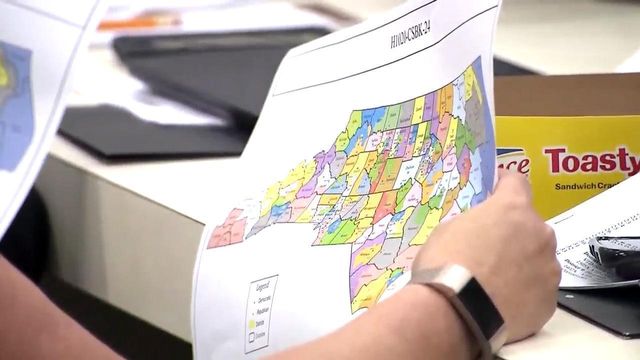No evidence of racial gerrymandering in NC Senate map, judge rules in win for GOP
There's no immediate evidence that Republican state lawmakers used racial gerrymandering to target Black voters when they redrew the new state Senate maps for the 2024 elections and beyond, a federal judge ruled Friday.
He declined to halt the elections for two Republican-leaning districts in the heavily Black northeastern part of the state. And while the case isn't over yet, the ruling means this year's elections will likely go on as planned — without new maps that could be more favorable to Black voters and Democrats. The majority of Black voters are registered as Democrats, state elections data shows.
Within minutes of the ruling, the voters who brought the lawsuit announced they'd appeal to the Fourth Circuit Court of Appeals. So the elections could still be affected, depending on what happens on appeal.
A spokesperson for Senate Republican leader Phil Berger didn't immediately respond to a request for comment on the ruling.
The case could also still go to trial, for a more thorough examination of the evidence including expert testimony. Even if the 2024 elections likely won't be immediately affected, the maps will also be used in the 2026, 2028 and 2030 elections — unless first struck down in court.
Two other racial gerrymandering lawsuits are also making their way through the courts, challenging the U.S. House and state House maps.
In Friday's ruling, however, Federal District Court Judge James Dever ruled that there wasn't enough immediately apparent evidence of racial gerrymandering in the state Senate map to force a redraw ahead of this year's elections.
Before being appointed to the bench by Republican President George W. Bush, Dever was an attorney who represented North Carolina Republicans on election law cases — including a landmark U.S. Supreme Court case on racial gerrymandering. That case found that the Democrats who controlled the state legislature in the 1990s had impermissibly used racial data to give Black voters too much representation in Congress.
Dever quoted that case prominently in Friday's ruling, citing the Supreme Court's decision that creating more majority-Black districts "threatens to carry us further from the goal of a political system in which race no longer matters."
He ruled that Republican state lawmakers had not violated the law when they declined to create a majority-Black district in northeastern North Carolina, which is home to a number of majority-Black rural counties. The new maps split up those Black voters between two districts rather than combining them in a single district. As a result that area is now expected to elect two Republicans to the state Senate, rather than one Republican and one Democrat.
The stakes are high: Republicans currently hold a veto-proof majority by just one seat in both the state Senate and House. So flipping just one seat could mean that Democrats break that supermajority — and thus give a hypothetical future Democratic governor more leverage over the state budget and other legislative issues.
Democratic Gov. Roy Cooper has vetoed more bills in his seven years as governor than all former governors combined. He had a 100% success rate when Republicans lacked a supermajority, but he has failed on nearly all of his vetoes during sessions when Republicans have had a supermajority.
Cooper is term-limited from running again in 2024; 10 candidates from the Republican, Democratic and Libertarian parties are seeking to replace him. That list will be whittled down after the party primary elections this March.
Cooper had previously filed an amicus brief in the case alongside Democratic Attorney General Josh Stein, who is running to replace Cooper as governor — with Cooper's endorsement. In that brief, they accused Republican state lawmakers of repeatedly targeting Black voters with discriminatory legislation, saying the new maps are just part of a broader trend of racially motivated legislation.
Dever allowed that brief to be submitted Friday, but he made it clear he would not give its arguments any weight at a potential future trial.
"Although the court grants Governor Cooper's and Attorney General Stein's motion to file an amicus brief, the court rejects their arguments as factually and legally unsupported," he wrote.














